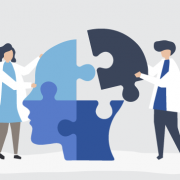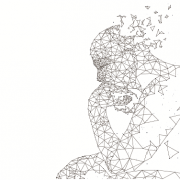Archive for month: January, 2019
Trust in Science in a Digital World: New Mechanisms Needed
ALLEA published the discussion paper “Trust in Science and Changing Landscapes of Communication” today. The paper examines how the increasing use of social media and other digital transformations affect and challenge trust relations between science, media and society.
In response to these challenges, the paper discusses the development of new tools for fact-checking and quality control of scientific information online. The authors urge political leaders to back and value scientific methods and standards of research integrity, and support digital innovations to overcome threats to public reasoning and scientific discourse.
While the widespread use of social media as a source of information might lead to a ‘context collapse’ of information, reinforce people’s confirmation biases and ultimately push the polarisation of societal groups through so-called ‘echo-chambers’ and ‘filter-bubbles’, the paper warns about a growing corporatisation of communication, a lack of funding for quality science journalism, (geo-) political computational propaganda and disinformation campaigns, as well as an increasingly polarised political climate.
All these trends have substantial consequences for the communication of science and might threaten the core pillars of trust in science as well as media: integrity, transparency, autonomy and accountability. The paper proposes to develop new mechanisms for researchers, journalists and other communicators of research to safeguard and reinforce these pillars and counter a loss of trust and trustworthiness.
Researchers “need to convincingly prove that a free and just society means a society in which all people are equal, but not all expressions are equally true. It is a society in which everyone should have unrestricted access to data and information, but also the opportunity and civic duty to acquire the skills needed to evaluate knowledge claims. This is why it is crucial to reflect on how we can effectively organise and defend a democratic digital society in which trust in expertise is anchored in longstanding and well-established standards – but wrapped in new mechanisms.”
The paper considers that researchers “need to become even more transparent, more ‘observable’, and more public than before”, engage in online debates regarding their field of expertise and “guide non-experts by systematically deconstructing and refuting deceitful stories and outright fabrications”. “Automated tools for fact-checking, flagging, online linking and referencing have to be developed and carefully tested in order to help citizens identify quality information”, the authors argue.
However, as the paper concludes, there are limits to what a good-hearted and motivated scientific community can do to overcome the identified obstacles by merely improving its (digital) communication. Without a supportive political backing that values scientific methods and standards of research integrity, and effectively protects science and society from the threats identified in this paper, “all well-meaning efforts might come to naught and look like bringing origami flowers to a machine-gun fight.”
Note to Editors
The discussion paper reflects the conclusions of a workshop held by the ALLEA Working Group “Truth, Trust & Expertise” at the Royal Netherlands Academy of Sciences and Arts in Amsterdam in August 2018. The expert group, chaired by Baroness O’Neill of Bengarve and Professor Ed Noort, is a transnational platform for perspectives on the nature and relationship between truth, trust and expertise in the field of science and research.
The discussion paper “Trust in Science and Changing Landscapes of Communication” and all preceding issues can be found here.
For press inquiries, interviews with experts or requests of hard copies please contact Susana Irles (irles@allea.org).
For content related inquiries please contact Daniel Kaiser (kaiser@allea.org).
Related Event
ALLEA and Re-Imagine Europa have organised the international forum “Democracy in a Digital Society – Trust, Evidence and Public Discourse in a Changing Media Environment”, taking place on 24 January, at the Berlin-Brandenburg Academy of Sciences and Humanities. On this occasion, Baroness O’Neill of Bengarve and Professor Christiane Woopen will discuss the findings of the ALLEA Working Group Truth, Trust and Expertise with a wider audience alongside contributions by EU Commissioner Mariya Gabriel, Manuel Castells and other prominent speakers from policy, academia and civil society.
For further information on the event and a livestream please click here.
ALLEA publishes second Discussion Paper on Loss of Trust in Science and Expertise
The ALLEA discussion paper “Trust Within Science: Dynamics and Norms of Knowledge Production” is now available. It was drafted by experts from the ALLEA Working Group Truth, Trust and Expertise.
 The publication reflects on some specific approaches that academic research can adopt towards the common goal of producing reliable, reproducible and trustworthy scientific evidence. It also takes a normative stance by reaffirming the need for more articulated and context-sensitive standards of research integrity, greater and better inter-, multi- and transdisciplinary collaboration, re-adjustments in the evolving system of scientific publishing, and the importance of ethical guidance as a shaping asset for trustworthy research.
The publication reflects on some specific approaches that academic research can adopt towards the common goal of producing reliable, reproducible and trustworthy scientific evidence. It also takes a normative stance by reaffirming the need for more articulated and context-sensitive standards of research integrity, greater and better inter-, multi- and transdisciplinary collaboration, re-adjustments in the evolving system of scientific publishing, and the importance of ethical guidance as a shaping asset for trustworthy research.
The paper thereby seeks to understand and value the different methodological approaches that inform knowledge production. How can different scientific disciplines trust and learn from each other? Are there common research standards that are clearly shared by all disciplines and constitute the ‘backbone’ of scientific practice? How can these standards be effectively communicated to a wider audience? These are the questions addressed in this issue.
The publication follows the ALLEA discussion paper Loss of Trust? Loss of Trustworthiness? Truth and Expertise Today, which focused on how trust in expertise is placed or refused more generally.
Conference Proceedings: Science in Times of Challenged Trust and Expertise
The conference proceedings present the topics discussed in the symposium “Science in Times of Challenged Trust and Expertise”, held in the context of ALLEA’s General Assembly at the Bulgarian Academy of Sciences in Sofia on 16 May 2018
The symposium addressed the challenges posed to science in its role as a trusted source of evidence and expertise. Jointly published by ALLEA and the Bulgarian Academy of Sciences, the publication is divided into three sections. Each section starts with a keynote speech, followed by comments from two discussants, and concluded by a plenary discussion. Contributors include fellows of academies, members of the ALLEA Working Group Truth, Trust and Expertise, as well as young researchers, covering expertise from a variety of geographical and disciplinary backgrounds.
SAPEA report: Evidence on microplastics does not yet point to widespread risk
SAPEA (Science Advice for Policy by European Academies) has published an Evidence Review Report today with the aim of informing the forthcoming Scientific Opinion from the European Commission’s Group of Chief Scientific Advisors on the issue of microplastics.
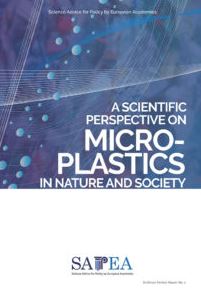 According to the report, the best available evidence suggests that microplastics and nanoplastics do not pose a widespread risk to humans or the environment, except in small pockets. But that evidence is limited, and the situation could change if pollution continues at the current rate.
According to the report, the best available evidence suggests that microplastics and nanoplastics do not pose a widespread risk to humans or the environment, except in small pockets. But that evidence is limited, and the situation could change if pollution continues at the current rate.
The SAPEA report’s authors draw on a comprehensive examination of the best available evidence from the natural sciences and computer modelling, as well as social, political and behavioural sciences. They highlight that microplastics – tiny particles under 5mm in length – are already present across air, soil and sediment, freshwaters, seas and oceans, plants and animals, and in several components of the human diet. These particles come from a variety of sources, including plastic products, textiles, fisheries, agriculture, industry and general waste.
While high concentrations of these particles have been shown to cause physical harm to the environment and living creatures in controlled experiments, the authors point out that concentration levels measured in the real world are well below this threshold – though there are also limitations in the measurement methods currently available.
You can access the full SAPEA report here.
About SAPEA
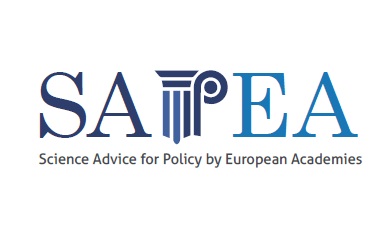 SAPEA (Science Advice for Policy by European Academies) is an integral part of the European Scientific Advice Mechanism (SAM), which provides independent, interdisciplinary, and evidence-based scientific advice on policy issues to the European Commission. SAPEA brings together outstanding knowledge and expertise from over 100 academies, young academies, and learned societies in over 40 countries across Europe. Funded through the EU’s Horizon 2020 programme, the SAPEA consortium comprises Academia Europaea (AE), All European Academies (ALLEA), the European Academies’ Science Advisory Council (EASAC), the European Council of Academies of Applied Sciences, Technologies and Engineering (Euro-CASE), and the Federation of European Academies of Medicine (FEAM).
SAPEA (Science Advice for Policy by European Academies) is an integral part of the European Scientific Advice Mechanism (SAM), which provides independent, interdisciplinary, and evidence-based scientific advice on policy issues to the European Commission. SAPEA brings together outstanding knowledge and expertise from over 100 academies, young academies, and learned societies in over 40 countries across Europe. Funded through the EU’s Horizon 2020 programme, the SAPEA consortium comprises Academia Europaea (AE), All European Academies (ALLEA), the European Academies’ Science Advisory Council (EASAC), the European Council of Academies of Applied Sciences, Technologies and Engineering (Euro-CASE), and the Federation of European Academies of Medicine (FEAM).
For further information visit: www.sapea.info
100th anniversary of the National Academy of Sciences of Ukraine
This past 27th of November marked the 100th Anniversary of the National Academy of Science (NAS) of Ukraine. A jubilee to celebrate the occasion was held on 6-7 December in Kiev. ALLEA was represented by its Vice President, Professor Graham Caie (Royal Society of Edinburgh).
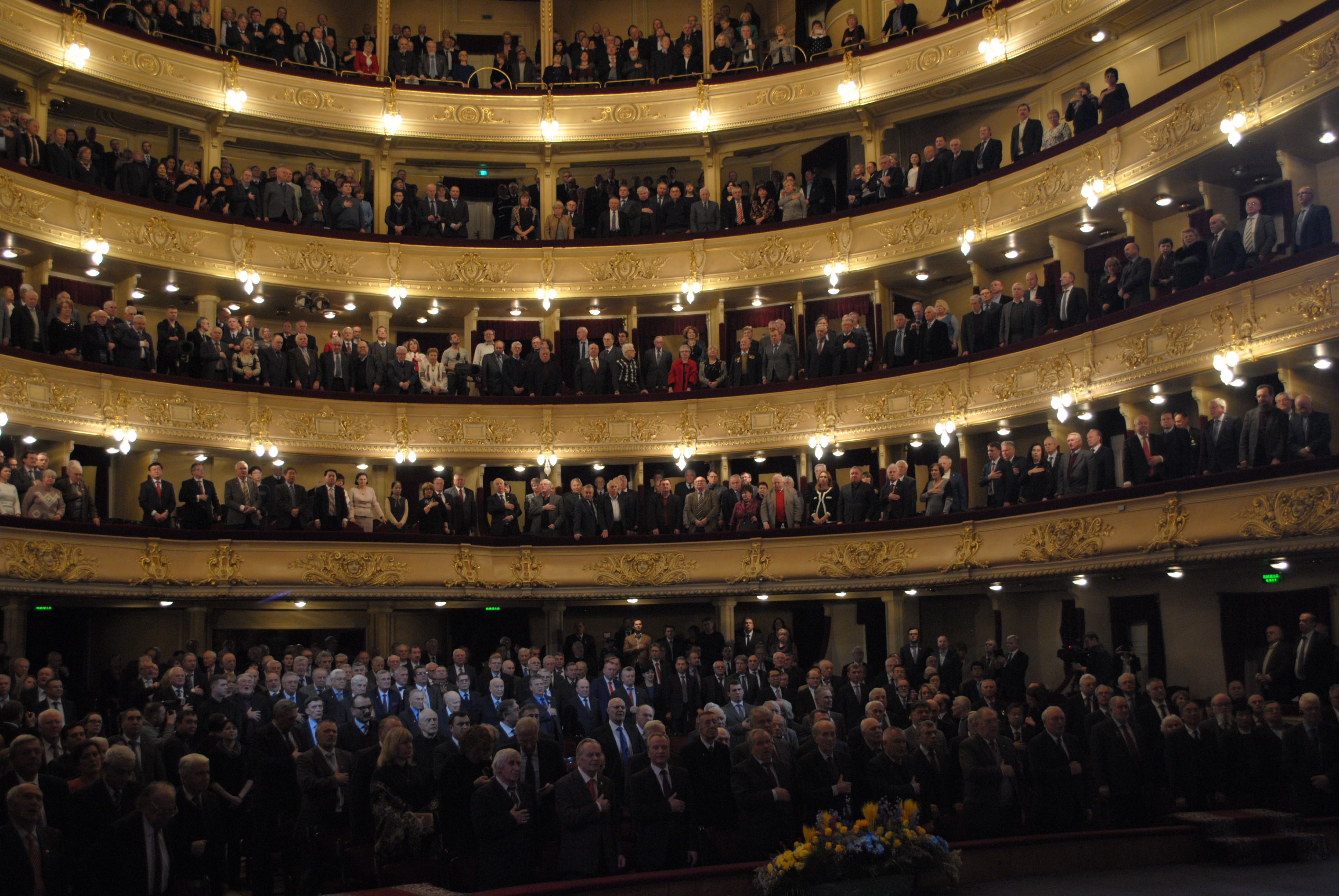
The jubilee session for the National Academy of Sciences of Ukraine, which took place at the Taras Shevchenko National Opera and Ballet Theatre in Kiev, had the presence of renown scholars and academicians from Europe and beyond. ©NAS of UKraine
The celebratory activities included an exhibition of the scientific and technical achievements of the various institutions within the NAS of Ukraine, as well as visits to a few landmarks of Kiev, such as the National Conservation Area “Sophia of Kyiv” and the National Kyiv-Pechersk Historical Cultural Preserve.
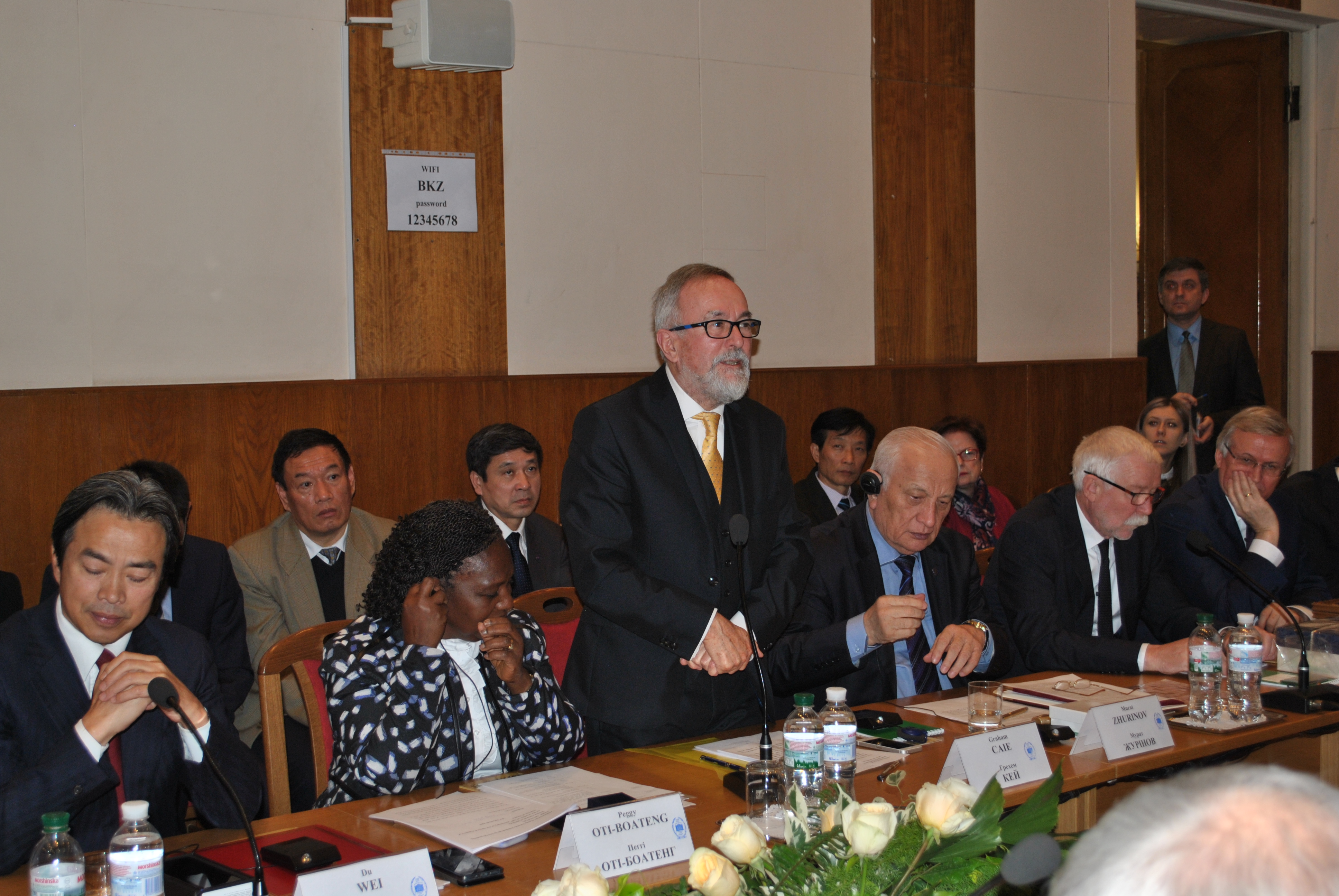
Professor Graham Caie delivers a speech in honour of the 100th Anniversary of the National Academy Sciences of Ukraine. ©NAS of Ukraine
A jubilee session and a festive concert at the Taras Shevchenko National Opera and Ballet Theatre of Ukraine were held on 7 December, with the presence of Boris E. Paton, President of the NAS of Ukraine and Chairman of the National Committee for Systems Analysis, and Anatoly G Zagorodny, Vice President of the NAS of Ukraine. ALLEA was represented by its Vice President, Professor Graham Caie, who also delivered a congratulatory speech on this occasion.
About the NAS of Ukraine
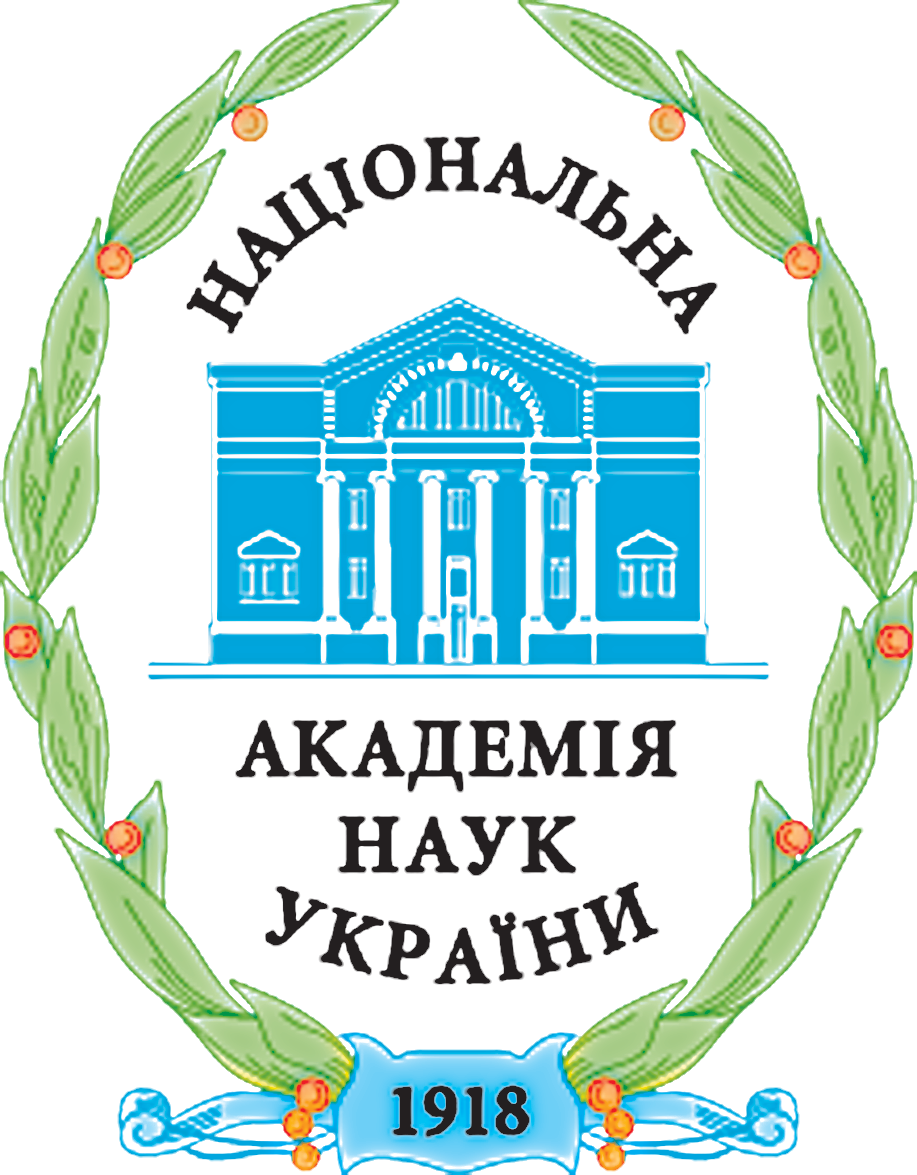 The National Academy of Sciences (NAS) of Ukraine was founded on 27 November 1918 in Kiev. It was the oldest republican academy in the former Soviet Union. It started with the three research departments: History and Philology, Physics and Mathematics, and Social Studies; at that time, the Academy incorporated 3 institutes, 15 commissions, and national library.
The National Academy of Sciences (NAS) of Ukraine was founded on 27 November 1918 in Kiev. It was the oldest republican academy in the former Soviet Union. It started with the three research departments: History and Philology, Physics and Mathematics, and Social Studies; at that time, the Academy incorporated 3 institutes, 15 commissions, and national library.
Today, the NAS of Ukraine is the highest scientific research oriented and self-governing organisation of Ukraine, being attributed over 90% of all discoveries made and registered in the country. The NAS of Ukraine is doing studies in all fields of scholarly research. It has 3 sections, 14 departments, nearly 170 institutes and research centres, and employing about 16,000 researchers.
The National Academy of Sciences of Ukraine has been a full ALLEA Member Academy since 1996.




